Faculty of Economics University of Zagreb Celebrates 100 Years
ZAGREB December 5, 2020 – With over 9000 students currently enrolled, the Faculty of Economics University of Zagreb is the largest faculty in Croatia. In 2020, this internationally renowned institution celebrates its 100th birthday, so TCN decided to take a closer look.
Every other student you meet in Croatia seems to study economy. It makes you wonder where they all go to after their studies are complete. Are there really so many positions for economists in Croatia?
In 2020, the Faculty of Economics University of Zagreb celebrates its 100th birthday. The long list of its famous former students gives a clue to where all the Croatian economists go – the tourism sector, diplomacy and international relations, business, politics and government.
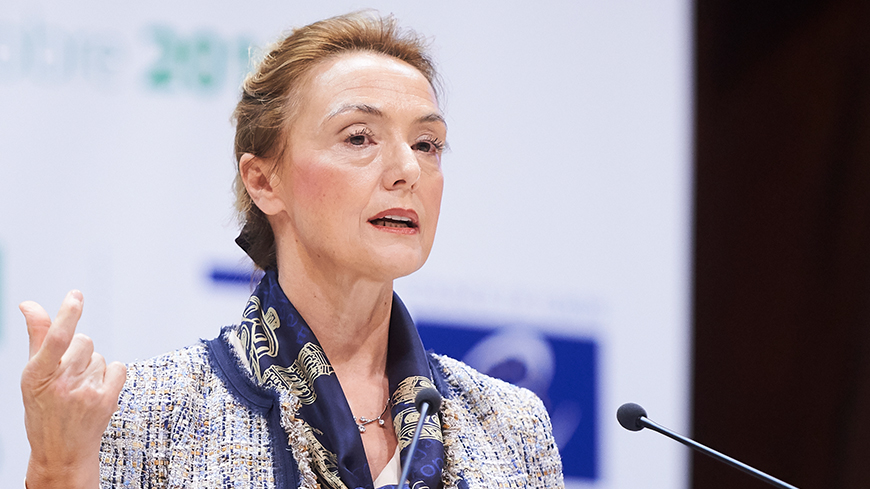 Marija Pejčinović Burić, a graduate of the Faculty of Economics of the University of Zagreb and the current Secretary General of the Council of Europe. After graduating, like Savka Dabčević-Kučar, she became o doctor of economics and before taking her current position served as Croatia's Deputy Prime Minister and Minister of Foreign and European Affairs © Council of Europe
Marija Pejčinović Burić, a graduate of the Faculty of Economics of the University of Zagreb and the current Secretary General of the Council of Europe. After graduating, like Savka Dabčević-Kučar, she became o doctor of economics and before taking her current position served as Croatia's Deputy Prime Minister and Minister of Foreign and European Affairs © Council of Europe
Graduates of the Faculty of Economics University of Zagreb have served as mayors of Zagreb and Split, Deputy Prime Minister of Croatia, Minister of Finance, Minister of the Economy, Secretary-General of the Council of Europe, Governers of the Croatian National Bank, Vice-President of the UN World Food Council, President of the Croatian Football Association, Minister of Environmental and Nature Protection, special advisors to the President of Croatia and countless university professors, including several former rectors of the University of Zagreb. Within its graduate professors, it has produced no less than 19 full members of the prestigious Croatian Academy of Sciences and Arts, more than any other single institution in the country. Savka Dabčević-Kučar, a graduate of the Faculty of Economics of the University of Zagreb. Born on Korčula, she became an anti-fascist in World War II, joining the partisans after her brother was beaten by fascists. After graduating, she continued to study at the faculty and became one of the first doctors of economics in Croatia, raising eyebrows by choosing to write her doctorate dissertation about a non-Marxist economic theorist (Englishman John Maynard Keynes). She became a professor at the faculty in the 1950s and despite her great advances in political life, remained a committed teacher at the faculty until 1971. In 1967, she was elected President of the Socialist Republic of Croatia. In 1969, she moved to an even more important position - that of president of the Central Committee of the League of Communists of Croatia. She was the first woman in Europe to be appointed head of government of a political entity and the first female in Croatia to hold an office equivalent to a head of government. In this picture, she addressed supporters on Ban Jelacic Square Zagreb during the movement called the Croatian Spring, which called for greater autonomy for Croatia. At the address, thousands cheered her as “Savka, queen of the Croats”. For her pivotal role in the movement, she was removed from her positions and public life and retired. She returned to politics in 1990 upon the collapse of communism in Europe and during the Croatian war of independence was one of the few politicians who visited the front lines of battle in Slavonia, Petrinja, Pokupski and the Dalmatian hinterland
Savka Dabčević-Kučar, a graduate of the Faculty of Economics of the University of Zagreb. Born on Korčula, she became an anti-fascist in World War II, joining the partisans after her brother was beaten by fascists. After graduating, she continued to study at the faculty and became one of the first doctors of economics in Croatia, raising eyebrows by choosing to write her doctorate dissertation about a non-Marxist economic theorist (Englishman John Maynard Keynes). She became a professor at the faculty in the 1950s and despite her great advances in political life, remained a committed teacher at the faculty until 1971. In 1967, she was elected President of the Socialist Republic of Croatia. In 1969, she moved to an even more important position - that of president of the Central Committee of the League of Communists of Croatia. She was the first woman in Europe to be appointed head of government of a political entity and the first female in Croatia to hold an office equivalent to a head of government. In this picture, she addressed supporters on Ban Jelacic Square Zagreb during the movement called the Croatian Spring, which called for greater autonomy for Croatia. At the address, thousands cheered her as “Savka, queen of the Croats”. For her pivotal role in the movement, she was removed from her positions and public life and retired. She returned to politics in 1990 upon the collapse of communism in Europe and during the Croatian war of independence was one of the few politicians who visited the front lines of battle in Slavonia, Petrinja, Pokupski and the Dalmatian hinterland
The Faculty of Economics University of Zagreb is the largest faculty in the country. Over its 100 year history, it has established itself as an internationally respected institution. Today, it has around 9000 persons enrolled, caters for international students with some courses in English and has produced over 86, 000 graduates, including 856 doctors of science.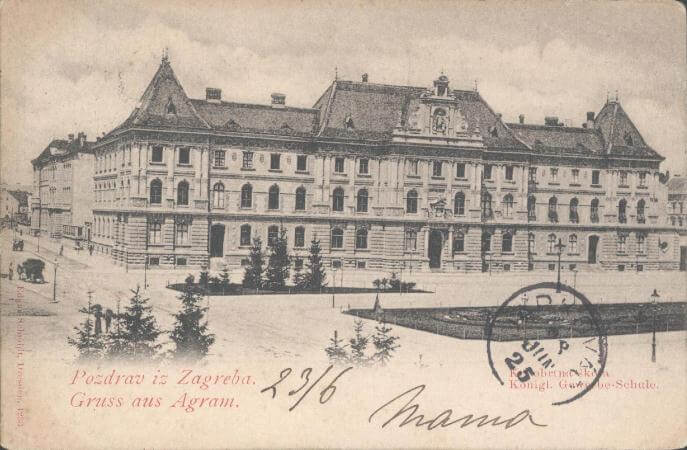 In its infancy, students of the College of Trade and Transport were taught at the Technical College, which is today the Museum of Arts and Crafts in Zagreb © National and University Library in Zagreb
In its infancy, students of the College of Trade and Transport were taught at the Technical College, which is today the Museum of Arts and Crafts in Zagreb © National and University Library in Zagreb
The history of the Faculty of Economics University of Zagreb starts with the opening in 1920 of its forerunner, the Zagreb College of Trade and Transport. Its purpose was to educate in the areas of banking, domestic and international trade, transport, consular services, insurance and the education of teachers. Its courses lasted three years and it proved so popular that in the academic year 1923/24, some 1,125 students were enrolled.
The institution held college status until 1925 when Stjepan Radić became the Minister of Education. It must have been unusual for Radić to find himself as part of the government of the Kingdom of Serbs, Croats and Slovenes, the state which preceded the Kingdom of Yugoslavia. Today, Radić is best remembered as a politician outspoken in his advocacy of autonomy for Croatia. Before his appointment to the government, he had always done so in opposition. Indeed, he had been imprisoned several times for his views, which were proclaimed loudly in his writings or in person (he was a gifted public speaker). As recently as March 1925 he had been in prison but, when the political party of which he was a member officially recognised the monarchy and the state constitution, he was freed. In a remarkable turnaround, before the year's end, he was a minister in the government.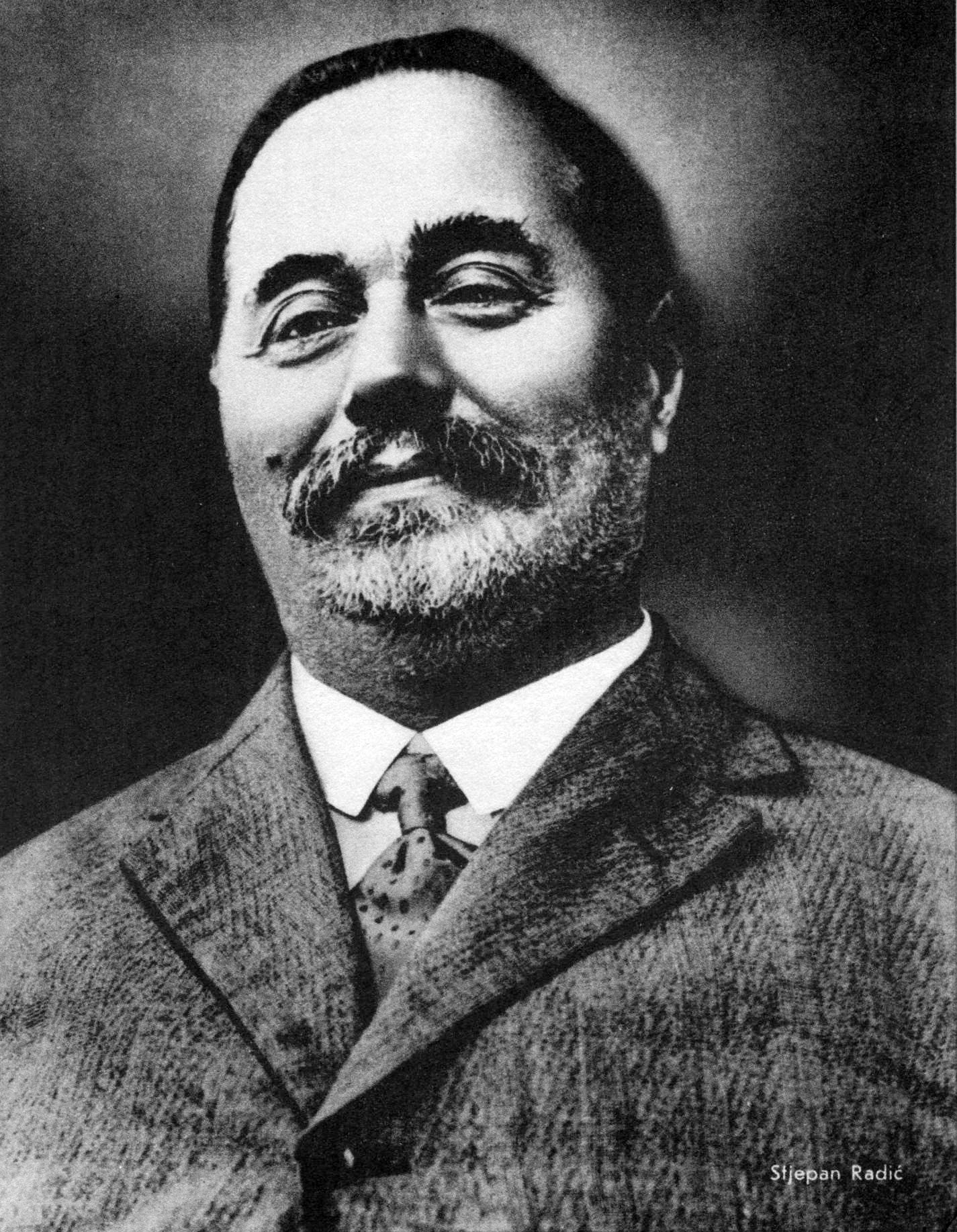 Stjepan Radić, pictured in the 1920s © public domain. In 1895 Radić was sent to prison for the public burning of the Hungarian flag in Zagreb – alongside Antun Dabčević, the father of Savka Dabčević-Kučar.
Stjepan Radić, pictured in the 1920s © public domain. In 1895 Radić was sent to prison for the public burning of the Hungarian flag in Zagreb – alongside Antun Dabčević, the father of Savka Dabčević-Kučar.
Stjepan Radić's desire for Croatian autonomy was not born from the ideals of the political class of Zagreb. The ninth of eleven children, born to a peasant family in a small village on the banks of the Sava river, just north of Sisak, Radić was very much a representative of the people whence he came. To him (and others in his family – his brother and nephew also being prominent politicians), education had the most important role to play in emancipation. He had lived in poverty in order to complete his own - after being banned from university-level educational institutions throughout the whole of the Austro-Hungarian empire for his protests against the state, he travelled penniless to Russia, France and Switzerland to complete his studies. In the latter, finance was one of his chosen subjects.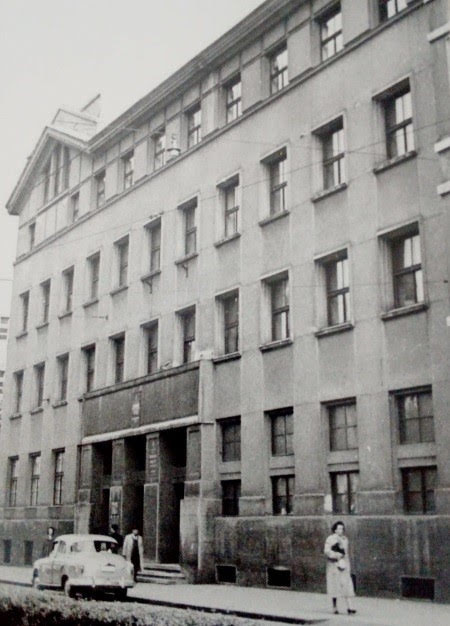 The first dedicated building of the Higher School of Economics and Commerce was located on the corner of Bauerova and Zvonirmirova © Faculty of Economics University of Zagreb
The first dedicated building of the Higher School of Economics and Commerce was located on the corner of Bauerova and Zvonirmirova © Faculty of Economics University of Zagreb
Under Radić's spell in office, the Zagreb College of Trade and Transport became the Higher School of Economics and Commerce. Its courses extended to four years, it attained university status. With no building designated to the increasingly popular institution, students had sometimes been taught at the Technical College (today's Museum of Arts and Crafts) and in parts of what is now the Mimara Museum. A dedicated home for the faculty was authorised and its construction started in 1927. Classes began at the faculty, located on the corner of Bauerova and Zvonimirova, in 1928, but within the decade the institution had outgrown its home and a plot of land in Svetice was acquired in order to build a new, larger facility. Its construction was interrupted by the Second World War and students would end up being taught on the Bauerova and Zvonimirova site all the way up to 1952.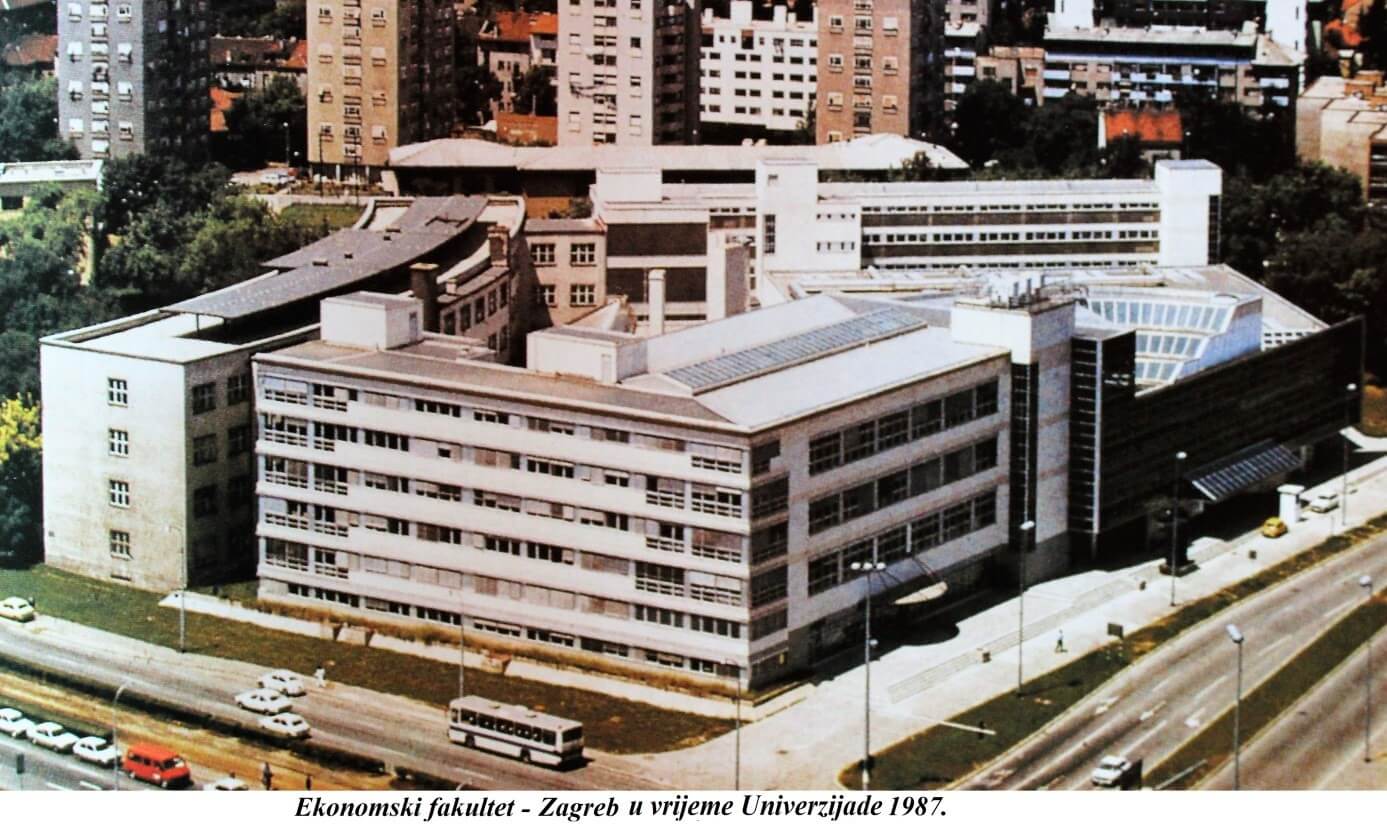 The faculty's modern building, pictured in 1987. Today, the faculty has 17 departments - Finance, Demography, Economic Theory, Business Economics, Informatics, Macroeconomics and Economic Development, Marketing, Mathematics, International Economics, Business in Foreign Languages, Organization and Management, Law, Accounting, Statistics, Trade and International Business, Tourism, Physical Education and Health © Faculty of Economics University of Zagreb
The faculty's modern building, pictured in 1987. Today, the faculty has 17 departments - Finance, Demography, Economic Theory, Business Economics, Informatics, Macroeconomics and Economic Development, Marketing, Mathematics, International Economics, Business in Foreign Languages, Organization and Management, Law, Accounting, Statistics, Trade and International Business, Tourism, Physical Education and Health © Faculty of Economics University of Zagreb
In 1947, the Higher School of Economics and Commerce became the Faculty of Economics University of Zagreb. In 1952, the faculty officially moved to the new site in Svetice. In 1968 it expanded once more when it merged with the 12-year-old College of Economics. Since then, the building at Svetice has received major upgrades and further facilities of the faculty can now also be found at the university campus in Borongaj, in Varaždin, in Koprivnica and in Bjelovar. After a century of existence, the Faculty of Economics University of Zagreb's longstanding difficulties to meet the popularity of its courses with the space available are now over. Not only can they accommodate every Croatian economy student who makes the grade, but they are also able to offer places to some of the best international students. It would surely come as no surprise if they are still educating the future elites of business, banking, finance and politics in another 100 years.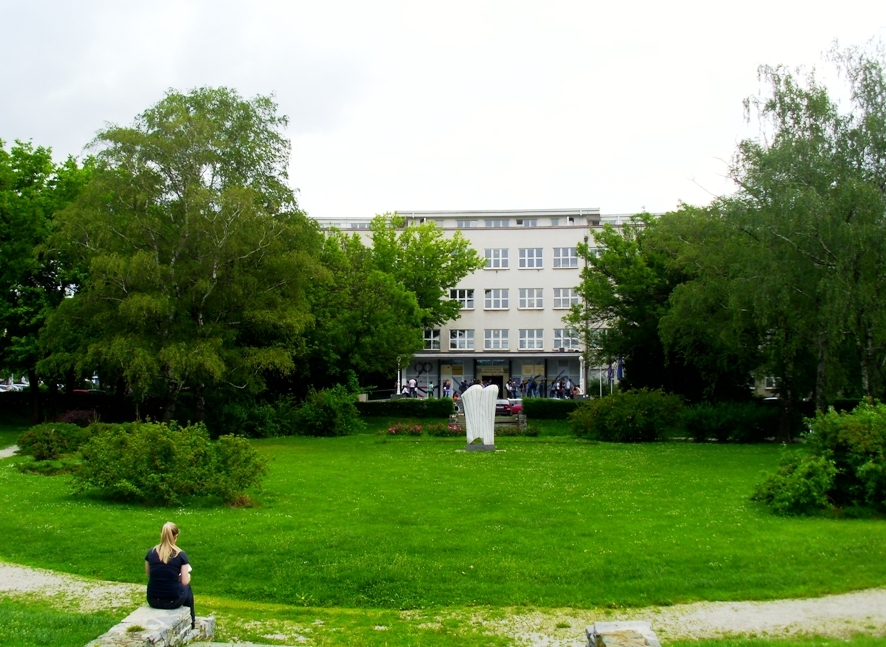
The Faculty of Economics University of Zagreb site in Svetice, as seen from its garden © Wolf - Pidgeon
Zagreb Medical Students Help in Fight Against Coronavirus
October 28, 2020 - As part of their classes, students of the University of Zagreb School of Medicine applied for volunteer work and assistance in performing all activities related to coronavirus.
As HRT reports, in the new situation related to the epidemic, additional educations were approved, as well as student work, and about 300 students from the Zagreb School of Medicine applied.
Coronavirus Information Call Center phones ring every second and students patiently respond and give callers epidemiological instructions, all of which are part of their practical classes in college.
"It's really good. We have a feeling that we are helping people. They call, they are worried. There are a lot of infected people. It is difficult to explain the self-isolation to them - who needs it, who doesn't, what a close contact is, and so on. I think this is very useful," says student Adela Ranogajec.
The questions are all sorts, says student Luka Ostojić. People who do not have a question related to COVID-19 are also calling.
"Students here acquire knowledge and skills that will be more than useful to them tomorrow or in a few months when they start working. That is why they consider this very important and they are extremely satisfied," says the teacher at the Zagreb School of Medicine, doc. dr. sc. Vera Musil.
In addition to epidemiological work and patient triage upon entering the hospital, students applied for assistance in taking samples and working in tertiary centers. They will undergo training and be assigned to checkpoints run by the Croatian Institute of Public Health in Novi Zagreb and at the institute in Rockefeller Street, announces the dean of the School of Medicine, prof. dr. sc. Marijan Klarica.
Students of the anesthesiology section participate in the pre-run at the entrance to Sveti Duh Hospital. They are enrolled depending on their abilities and schedule in college. So far, everything is going well, and if someone gives up, they have a replacement ready, says Lester Toni Dobrić from the Student Section for Anesthesiology and Resuscitation at the School of Medicine.
They work in shifts of 8 hours and are satisfied, and in addition to gaining useful knowledge, they help staff and relieve the system.
For the latest travel info, bookmark our main travel info article, which is updated daily.
Read the Croatian Travel Update in your language - now available in 24 languages
Science Faculty to Set Up First Climatological Research Center in Croatia
ZAGREB, Sept 30, 2020 - The University of Zagreb's Faculty of Science (PMF) plans to establish the First Climatological Research Center in Croatia that will be the central institution for inter-disciplinary climate and climate change research, the faculty reported on its website.
The faculty notes that as leading research and educational institution with a long tradition of teaching and research in various fields of climatology, it is going to establish the first Climatological Research Centre in Croatia.
Contemporary research and networking top scientists
Nowadays, climate change is the subject of numerous scientific studies, and due to their impact on the environment and living conditions on Earth, they are gaining more and more public attention, the center's head, Associate Professor Ivana Herceg Bulic underlined.
"Due to the extreme complexity of the Earth's climate system and the many complex processes and interactions, a multidisciplinary approach to study is necessary. That is why the Faculty of Science, which brings together scientists from various fields of science and mathematics, has exceptional strength and competencies for interdisciplinary and multidisciplinary scientific research," said Herceg Bulic.
She believes that with that approach the center will achieve quality scientific results and gain new knowledge about the vulnerability of natural and urban environments to climate change.
For the latest travel info, bookmark our main travel info article, which is updated daily.
Read the Croatian Travel Update in your language - now available in 24 languages
Korean Culture and Language Course Launched at the Faculty of Croatian Studies
ZAGREB, Sept 15, 2020 - Korean culture and language course was launched on Monday at the Faculty of Croatian Studies (HS) of the University of Zagreb, the faculty informed on Tuesday.
Ninety-six students enrolled in the course, which is beyond all expectations, and for the next 16 weeks, they will attend free classes four hours a week. This course is due to last until 28 December.
The enrolment quota was filled in just five days, HS said and added that the greatest interest was by students (79), while other entrants are 13 working people enrolled in the course and four secondary school students.
The course is being conducted in cooperation between the University of Zagreb and Chung-Ang University in Seoul and the King Sejong Institute Foundation (KSIF)
The course will be taught by EunGyeong Kim from Seoul, with administrative support by Lin Seonghyun Kwon, a post-graduate student of Croatian Studies.
HS Dean Pavo Barisic welcomed Ms. Kim and entrants and expressed his pleasure that in Croatia a King Sejong Institute was opened.
Barisic noted that the institutes of the King Sejong Foundation exist in 76 countries, 26 of which are in Europe.
More than 130 countries have applied for this year's call for cooperation and 30 new institutes have been approved, Barisic said. He underscored however that this is a great honor for the Croatian Studies Faculty.
The course will be available for at least three years and if interest continues the course may be extended in the future, according to Barisic's statement.
Once the students have completed the course they will be eligible for a student or working visa in South Korea.
For the latest travel info, bookmark our main travel info article, which is updated daily.
Read the Croatian Travel Update in your language - now available in 24 languages
World University Rankings Place Split In 801-1000 Range, Zagreb In 1001+
ZAGREB, Sept 2, 2020 - Times Higher Education (THE) has released its World University Rankings 2021, according to which the University of Oxford is again the best in the world, while the University of Split ranked in the 801-1000 range, and the University of Zagreb maintained its position in the 1001+ group.
The World University Rankings include over 1,500 universities from 93 countries, the biggest number so far. The list is based on 13 performance indicators in four areas: teaching, research, knowledge transfer, and international outlook.
The University of Split has fallen behind compared with the 2020 list when it was in the 601-800 range, but it remains the best-ranked Croatian university.
The University of Ljubljana was placed in the same range as Split and the University of Maribor in the same group as Zagreb. The University of Belgrade, ranked in the 601-800 range, is the best-ranked university in Serbia, while the University of Novi Sad was placed in the 1001+ group.
The University of Oxford tops the list for the fifth consecutive year, followed by Stanford University, Harvard University, California Institute of Technology, and Massachusetts Institute of Technology.
For the latest travel info, bookmark our main travel info article, which is updated daily.
Read the Croatian Travel Update in your language - now available in 24 languages
University Of Zagreb Remains Among 500 Top Universities
ZAGREB, Aug 16, 2020 - The 2020 Academic Ranking of World Universities (ARWU), released by ShanghaiRanking Consultancy on Saturday, shows that the University of Zagreb has retained its position between 401st and 500th place on the ranking.
This proves that Zagreb's tertiary education institution enjoys a status of an internationally competitive and excellent university, reads a press release issued by this oldest university in Croatia.
The ranking is topped by Harvard University, which is thus the top performer for 18 years.
Another U.S. university, Stanford, ranks second, while the University of Cambridge ranks third, just as they were last year.
Fifteen (15) universities in the USA, three British universities and a French and a Swiss university make the top 20 places.
Since 2003, ARWU has been presenting the world top universities annually based on transparent methodology and objective third-party data. It has been recognized as the precursor of global university rankings and the most trustworthy one. This year, the best 1000 universities in the world are published.
Six universities make their first-ever appearances in the Top 100, including four French ones, namely Paris-Saclay University(14th), PSL University(36th), University of Paris(65th) and Université Grenoble Alpes(99th), and two Chinese ones, namely the University of Science and Technology of China(73th) and Fudan University(100th). Beijing Jiaotong University and other 14 universities enter into the Top 500 list for the first time. More than 40 universities enter into Top 1000 list for the first time, reads the press release issued by ShanghaiRanking Consultancy.
Croatian Scientists Discover Gene That Protects Against Alzheimer's
July 27, 2020 – A breakthrough by Croatian-led team has far-reaching implications for the treatment and prevention of Alzheimer's
A team of Croatian-led scientists have discovered a gene that protects against Alzheimer's disease. The remarkable discovery was made by a Croatian-led team at Queen Mary University of London in collaboration with scientists at The Croatian Institute for Brain Research, School of Medicine, University of Zagreb. The discovery has far-reaching implications for both the prevention and treatment of Alzheimer's.
Alzheimer's is a degenerate brain disease that can be brought on by dementia. The main challenge in testing treatment drugs in trials is that participants need to already have symptoms. But, once people have symptoms, it is usually too late for treatments to have a significant effect, as many brain cells have already died.
Because of an extra chromosome they carry, people with Down's Syndrome have a 70% chance of developing the disease. So, the Croatian-led team took hair cells from people who have Down's Syndrome and genetically re-engineered to become stem cells. The stem cells were then grown into brain cells in a laboratory dish.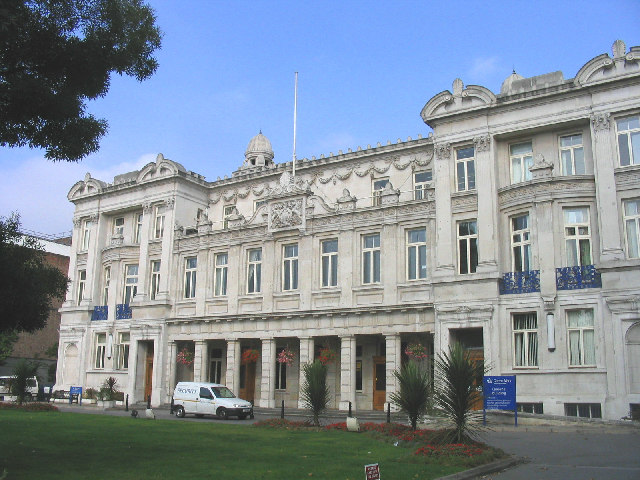
Queen Mary University of London © John Winfield
Studying the cells, the scientists were able to see Alzheimer’s-like pathology develop rapidly. They were then able to take two drugs and test their effectiveness in inhibiting the progression of the disease. Within six weeks, they proved that the drugs prevented the onset of Alzheimer’s-pathology.
The research also found proof of an Alzheimer’s suppressor gene (BACE2) that exists naturally within the brain. By increasing the activity of the gene, it is hoped Alzheimer's can be slowed in its progression or eventually prevented altogether. The research has far-reaching implications for testing those who may eventually develop Alzheimer's and on testing drugs for the prevention and treatment of the disease.
The team at The Blizard Institute, Barts & The London School of Medicine, Queen Mary University of London was lead by Croatian Professor Dean Nižetić. The international team that published their findings included another young Croatian scientist, Ivan Alić, who worked alongside Nižetić in London, plus Željka Krsnik, Goran Šimić, Ivica Kostović and Dinko Mitrečić from The Croatian Institute for Brain Research, School of Medicine, University of Zagreb.
President Milanović Advises Masters of Law to Be Critical of Politics
ZAGREB, February 29, 2020 - President Zoran Milanović on Saturday attended a graduation ceremony at the Zagreb Faculty of Law and told the masters of law that in their professional life they should make a contribution, build their knowledge, ask questions and be critical of politics.
Speaking as an alumnus of the school, Milanovic said, "I went my own way, thinking that I was fighting against injustice, and I still feel that, but on that path, as a politician, you make injustices without realising it."
He also spoke of the emigration of young people, saying that when he graduated in 1990, the bulk of young people wanted to go abroad too.
"That's human and curious. That's a quest for knowledge and for improvement, with the desire and the ambition to come back. In that I see a challenge for Croatia, because people are leaving en masse, but also coming back. One should be careful and create all the conditions to make people stay, without spreading a moral panic."
Countries like Lithuania and Poland have large numbers of emigrants but haven't collapsed because of that and are considered examples of a successful transition, Milanović said.
"Let's look around us, let's learn, let's not jump to conclusions, let's be sceptical but loyal, committed and faithful to ideals and our country," he added.
Dean Igor Gliha said three of Croatia's five presidents were lawyers and that eight of the 12 prime ministers studied law.
More politics news can be found in the dedicated section.
Book Launched to Mark 350th Anniversary of University of Zagreb
ZAGREB, December 17, 2019 - A monograph about the University of Zagreb was launched on Tuesday as part of events in the academic year 2018/2019 marking the 350th anniversary of this Croatian institution of tertiary education.
Addressing the launch of the monograph in Zagreb, Rector Damir Boras said that the monograph "is a document of the times and the tradition as well as a view to the future of our University".
He thanked the authors and contributors of this 700-page publication, edited by Professor Mirjana Polić Bobić of the Faculty of Humanities and Social Sciences.
The book, consisting of 20 chapters, includes a review of the past and development of the university and also an insight into its segments. The monograph deals with the university's international cooperation, the life of students and their associations, and it also covers the architectural heritage and provides a list of all honorary doctors and a list of rectors and vice-rectors.
According to information on the university website, "the history of the University of Zagreb began on 23 September 1669, when the Holy Roman Emperor and the King of Hungary and Croatia Leopold I gave the Jesuit Academy in the free royal city of Zagreb a diploma, granting it the status and privileges of a university institution. The recognition was adopted by the Parliament of the Kingdom of Croatia on 3 November 1671."
More news about the University of Zagreb can be found in the Lifestyle section.
Zagreb University Rector Receives Juan Vucetich Award
ZAGREB, December 7, 2019 - University of Zagreb rector Damir Boras on Friday received the 2019 Juan Vucetich Award for outstanding contribution to the promotion of relations and strengthening of the friendship between Argentina and Croatia.
Boras was presented with the award by Argentinean Ambassador Maximiliano Gregorio-Cernadas, who recalled the rich history of relations between the two countries.
The cooperation between the two states and peoples, which share a similar mentality, is better and better thanks to systematic advocacy by institutions as well as individuals like Boras, he said.
The award is named after Argentinean Croat anthropologist and policeman Juan Vucetich (1858-1925), the pioneer of fingerprint identification, known as dactyloscopy.
Gregorio-Cernadas said the award was being presented on the 350th anniversary of the University of Zagreb and the 27th anniversary of diplomatic relations between Argentina and Croatia.
The Juan Vucetich Award was established by the Argentinean Embassy in 2017 and its first laureate was Croatian politician Davor Ivo Stier, who was born and raised in Argentina.
More news about relations between Croatia and Argentina can be found in the Politics section.


